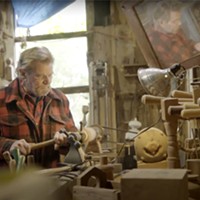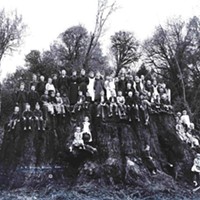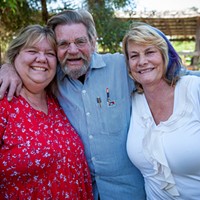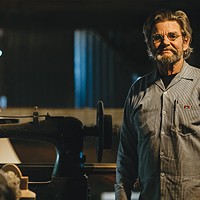A couple of months ago, Eric and Viviana Hollenbeck were having a quiet dinner with longtime friends Michael Fields and his wife Lynnie Horrigan.
They talked about the Blue Ox Historic Village the Hollenbecks have run for decades and a bit about Dell'Arte International, where Fields works as the artistic director and Horrigan does costume design. Then the conversation turned to Radioman, the play the Hollenbecks have been co-producing for a few years.
It had kind of stalled, the Hollenbecks said. They believed they had stellar material. Renowned playwright Jim McManus had taken Uncle Sam's Tour Guide to Southeast Asia, the book of poems Eric Hollenbeck penned while trying to come to grips with what he'd experienced as an 18 year old for seven and a half months on the frontlines of the Vietnam War, as well as interviews with scores of veterans in Eureka and Oregon, and turned them into a great script. They'd done a couple of readings — one in Los Angeles and one at the Blue Ox — and the veterans' monologues had touched people.
"People were crying," Viviana Hollenbeck says. "They were choked up."
Several theater companies were very interested in picking up the production, the Hollenbecks explained. The problem was the companies needed to see the play before they would commit to taking it on and efforts to raise enough funds to put on a showcase show — kind of a sneak preview for production companies — were stumbling.
"Well," Fields told the couple, "Dell'Arte has its theater free for the entire month of January."
In short order, Fields had agreed to help cast and co-direct the play, along with Roman Sanchez, sending Radioman hurtling toward an opening night that had seemed out of reach just a short time earlier. It meant that the thing that had become the Hollenbecks' obsession for more than two years — crafting a play based on the experiences of Eric and other veterans with a structure that loosely resembled The Vagina Monologues — would soon bear fruit.
The Hollenbecks are best known locally for the Blue Ox Mill and Historic Park, which encompasses a full production millworks shop, smithy, foundry, apothecary, print shop, ceramics, stained glass and fabrics studio, not to mention a working history museum, radio station, nonprofit, education programs for at-risk youth and a program for war veterans. What started with a $300 bank loan Eric Hollenbeck took out in 1973 to purchase the property and start a salvage logging company has grown into not only one of the best Victorian mills in the country — producing high-end historic reproductions that can be found in museums, churches and even the White House — but also a place for people to learn historic skills and, more importantly, to heal through the process of creating.
In 2015, Eric Hollenbeck led a team of about a dozen veterans from every branch of the military that used the only known photograph of President Abraham Lincoln's hearse to craft a historically accurate reproduction for the commemorative 150th anniversary parade honoring Lincoln's funeral. The experience — which included the veterans and their families being flown out to Springfield, Illinois, to see 150,000 people line the streets to see the hearse they had built — proved transformational and the Hollenbecks soon set their sights on providing an expanded veterans program.
The experience also left them resolved to see Radioman to the stage, seeing the value in veterans and their families sharing and discussing the mental scars of war. As Eric Hollenbeck has said many times, the U.S. government does a fine job of preparing young people to deploy to war zones but a piss-poor job of preparing soldiers to return to every day life.
Eric Hollenbeck was granted an early discharge after his father died. After spending seven-and-a-half months in near constant combat with the North Vietnamese Army, he was pulled from the front line and 72 hours later standing in his mother's kitchen. Thirty-six hours after that, he reported for work in the woods.
In many ways, he spent the ensuing five decades struggling to come to terms with his time in Vietnam and his abrupt return to civilian life. And Viviana Hollenbeck has watched, at times helplessly, as her husband has worked through the post-traumatic stress and residual trauma of war, which manifested at times in nightmares, increased drinking and social withdrawal.
"At times, I was furious at him," she says.
The script penned by McManus, they say, manages to encompass all of this, as well as the stories of other veterans from other wars.
"The actors aren't playing us, they're playing a composite of a lot of people," Viviana Hollenbeck says. "But there are parts of us in there."
"Like when she calls me an asshole," Eric Hollenbeck cracks, underscoring the dark humor that cuts through much of the play, making the heart-wrenching reality of its whole palatable.
There's no question the play is intensely personal and has required both Hollenbecks to repeatedly dive into and explore the traumas and trials of their past. As the production barrels toward opening night, Eric Hollenbeck says he hasn't watched any of the rehearsals because it's "emotionally very, very tough." Fields says it's clear that everyone involved feels the burden of delivering on Radioman's promise, both because they believe in the restorative power of how it might resonate with some veterans and because there's an obligation to the veterans whose stories have become a part of it.
In an interview with the Journal on Dec. 27, Fields notes that Horrigan is out looking through local shops for military fatigues to make sure characters are clad in attire appropriate for their specific conflict. Eric Hollenbeck offers a raspy chuckle as he recalls sitting at rapt attention while recently watching a BBC documentary that purported to be reporting from the front lines of a war zone until he saw a soldier walk by the camera with an M-16 rifle without a clip in it.
"It was jarring," he says. "The whole thing lost me right then."
Everyone's working hard to make sure nothing similar happens at Dell'Arte, Fields says, adding that the cast has set up Google documents to share stories about veterans, music from the Vietnam era, recordings from the Hollenbecks' shop and more to give the production a deeper layer of authenticity.
Hopes are clearly high for the production. Representatives from respected theater companies in La Jolla, California, and Denver, Colorado, have confirmed they will be in attendance, scouting for their upcoming seasons. Another in New York may send someone. It's not lost on anyone that this is Radioman's chance to leap to a larger stage that might enable the kind of traveling production the Hollenbecks have envisioned, bringing a focus on veterans to cities throughout the United States. The hope is it also might bring some additional resources to the Blue Ox, which co-producer Lester Grant set up as the official producer of the production, hoping it will become a kind of financial driver for the nonprofit.
Asked what he thinks it will feel like to walk into Dell'Arte on Jan. 10 and see parts of his life played out on the stage before him, Eric Hollenbeck says he knows it's going to be rewarding. And difficult. He says he also knows he's in a better place to go down that rabbit hole than he would have been even a handful of years ago.
Two things long haunted him about his time in the war, he says. The first was the sense that he and the 67 fellow members of his 101st airborne division didn't have a mission in Vietnam. He now knows that wasn't the case, explaining his division's role was to search out the enemy and make contact in an effort to disrupt North Vietnam's efforts to amass 15,000 soldiers for an offense.
"We stopped it," he says.
The second thing that long haunted him, Eric Hollenbeck says, is this sense that he was a victim. He says he used to ask himself, "Why me?"
"I've come to the realization that somebody had to do it," he says. "Why not me? I wasn't a victim. I was tough. I was good in the woods. It may as well have been me. That's a big place to come to after 50 fucking years."
Thadeus Greenson is the Journal's news editor. Reach him at 442-1400, extension 321, or [email protected]. Follow him on Twitter @thadeusgreenson.






Comments